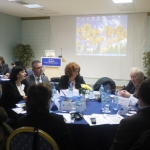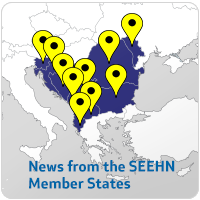
A Multi-Country Workshop on Public Health Policies on Migration and Health was held in Tirana, Albania on 19–20 March 2015, gathering close to 60 participants from Member States of the SEEHN[1], Kosovo*[2] and Turkey.
Organized by the Technical Assistance Information Exchange instrument of the European Commission (TAIEX) in cooperation with the Regional Health Development Centre (RHDC) on Surveillance and Control of Infectious Diseases and Institute of Public Health, Albania, the Workshop brought together experts of different sectors from SEEHN countries, Kosovo*, Turkey, EU Member States and International organizations (including WHO Europe) who shared and discussed knowledge, experiences and challenges in terms of establishing a regional cross-sectorial and cross border practical approach to migration and public health policies.
The workshop resulted in developing the following steps for further regional actions to progress in this area, in particular at the SEEHN Regional level:
- the need to define and agree on a “minimum” package of good health services to be provided for irregular migrants, who represent a particularly vulnerable group, in the countries of the SEEHN region;
- the SEEHN should establish a working group to identify, define and agree on the key data essential for action at the Regional level; the Member States of the SEEHN should provide detailed information on the available data in their respective countries;
- the SEEHN should, on the basis of the data provided, assess the situation, and propose, if appropriate, solutions, in particular cross-border solutions both within the SEEHN Region and with the neighbouring countries, in particular the EU Member States, in view of the vocation of the SEEHN countries to join the EU;
- the SEEHN should facilitate an in-depth exchange of information on the health services provided by the “Asylum Centres” in the SEEHN Region as well as in the neighbouring EU Member States with a view to optimise these services both for the benefit of the users and of the health systems of the countries;
- the SEEHN should request in particular Romania to present a health and economic benefits assessment of the use of “health mediators” with a view to develop possibly a common approach at the SEEHN level.
The need to develop strong partnerships within the SEEHN as well as with the neighbouring countries from which in particular irregular migrants (unplanned migration) originate is essential for a comprehensive and effective policy in this area in particular from the public health perspective. In this context the need to exchange experiences and to develop partnerships was stressed, including in relation to the possibility of impacting on the health services in the SEEHN countries as well as at Regional level.
[1] SEE Health Network: The SEE Health Network was established in partnership with the Council of Europe and the WHO Regional Office for Europe within the framework of the Stability Pact Initiative for Social Cohesion. It comprises of Republic of Albania, Bosnia and Herzegovina2, Republic of Bulgaria, Republic of Croatia, Republic of Moldova, Montenegro, Romania, Republic of Serbia, the State of Israel and The Former Yugoslav Republic of Macedonia
[2] Kosovo*: KS=Kosovo*; this designation is without prejudice to positions on status, and is in line with UNSCR 1244 and the ICJ Opinion on the Kosovo Declaration of Independence
[3] Ministry of Civil Affairs on the behalf of Bosnia and Herzegovina’s health authorities: Ministry of Civil Affairs of Bosnia and Herzegovina, Federal Ministry of Health, Ministry of Health and Social Welfare of the Republic of Srpska and Department of Health and Other Services of Brčko District
TAIEX Multi-country Workshop on PH policies on Migration and Health, March 2015, Tirana (photo credit: SECIDS)








